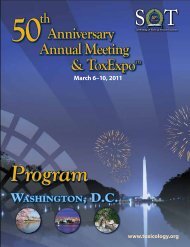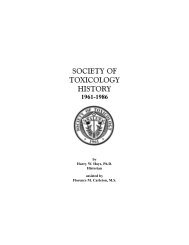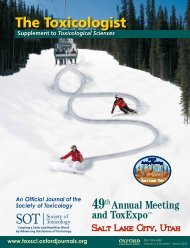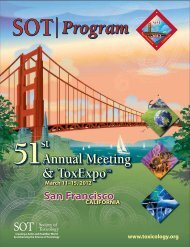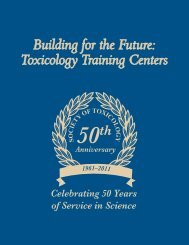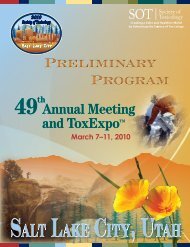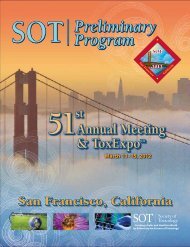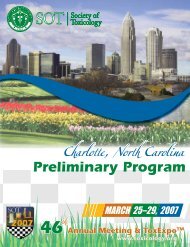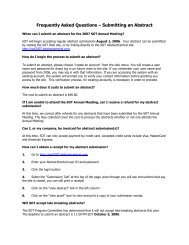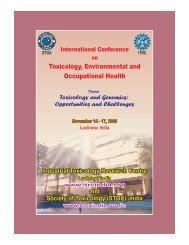Annual Meeting & ToxExpo Annual Meeting & ToxExpo Annual ...
Annual Meeting & ToxExpo Annual Meeting & ToxExpo Annual ...
Annual Meeting & ToxExpo Annual Meeting & ToxExpo Annual ...
Create successful ePaper yourself
Turn your PDF publications into a flip-book with our unique Google optimized e-Paper software.
EXHIBITOR HOSTED SESSIONS<br />
2:15 PM to 3:15 PM, Room 140A<br />
Machine Learning and Exposure to Modeling in the<br />
Prediction of In Vivo Toxicity from High Content<br />
Screening (HCS) Data<br />
Presented by: Cyprotex Discovery<br />
High content screening (HCS) is a powerful tool for generating<br />
insight into changes arising from exposure of cells to potentially<br />
toxic xenobiotics. Linking these changes to in vivo toxic responses<br />
enables the creation of predictive models for in vivo drug-mediated<br />
toxicity. In this presentation, novel developments in modeling of<br />
drug-induced hepatotoxicity from HCS data will be described.<br />
2:15 PM to 3:15 PM, Room 140B<br />
Automated GLP Infusion Studies: Improved<br />
Process Quality and Labor Utilization<br />
Presented by: Instech Solomon<br />
GLP infusion studies, rife with high labor content and opportunities<br />
for quality improvement, present a classic automation opportunity.<br />
This session describes the costs (investment) and benefits (reduced<br />
labor and improved process data quality) of moving from manual to<br />
Part 11 compatible automated processes.<br />
2:15 PM to 3:15 PM, Room 156<br />
Predictive Analysis of Cell Viability, Apoptosis and<br />
ADME/Tox Properties Using Multiparametric In Vitro<br />
Assays and Human Induced Pluripotent Stem (iPS) Cell-<br />
Derived Cardiomyocytes and Hepatocytes<br />
Presented by: Promega Corporation<br />
This seminar will highlight the use of multiplexed bioluminescent<br />
and fluorescent cell-based assays with human iPS cell-derived<br />
cardiomyocytes and hepatocytes that offer a powerful new approach<br />
to predictive analysis of cell viability, apoptosis and ADME/Tox<br />
properties while enabling streamlined data collection, high data<br />
quality and robust interpretation with biologically relevant human<br />
cell model systems.<br />
3:30 PM to 4:30 PM, Room 140A<br />
The Use of Minipigs in the Development of<br />
New Medicines<br />
Presented by: Ellegaard Göttingen Minipigs A/S<br />
This session provides an overview of marketed drug products where<br />
minipigs were used for safety and/or efficacy assessment. General<br />
trends of use are identified, furthermore its predictivity towards<br />
select clinical adverse reactions is evaluated.<br />
3:30 PM to 4:30 PM, Room 140B<br />
Cryopreserved HepaRG: An Alternative In Vitro<br />
Screening Tool for Human Hepatic Drug Metabolism, and<br />
Safety Applications<br />
Presented by: Life Technologies<br />
The use of primary human hepatoxytes in screening applications is<br />
limited by tissue availability, donor variability, cost and a relative<br />
short lifespan in culture. The use of HepaRG cells solves these<br />
limitations without sacrificing many of the critical hepatocyte traits<br />
such as drug metabolizing enzyme expression, functional transport<br />
proteins, and expression of key nuclear receptor pathways.<br />
WEDNESDAY, MARCH 9<br />
9:15 AM to 10:15 AM, Room 140A<br />
Reproductive and Developmental Toxicity<br />
Testing of Vaccines and Biologics<br />
Presented by: Charles River<br />
The regulatory-required testing of large molecules (vaccines<br />
and biologics) prior to marketing for effects on reproduction and<br />
development of the fetus presents unique problems in the selection<br />
of appropriate species, the timing of treatment, the evaluation of the<br />
response to treatment and the relevance of any findings to humans.<br />
9:15 AM to 10:15 AM, Room 140B<br />
Key Six Sigma Methods Applied to Surgical Services for<br />
Operational Excellence<br />
Presented by: Harlan Laboratories, Inc.<br />
Harlan Laboratories removed non-value added steps and reduced<br />
sources of variation within our rodent surgical services processes<br />
using Lean Six Sigma methods. This was key to achieving<br />
operational excellence as toxicologists and others increased demand<br />
for our outsourced surgical services.<br />
9:15 AM to 10:15 AM, Room 156<br />
Developing Local and Systemic Biologics to Treat<br />
Inflammation of the Lung<br />
Presented by: Huntingdon Life Sciences<br />
Pharmaceutical companies have investigated the respiratory route<br />
as a potential to deliver large molecular weight drugs systemically.<br />
Many companies are continuing to explore the respiratory route for<br />
the treatment of local inflammation. Equally a number of companies<br />
are using systemically delivered drugs to treat inflammation of the<br />
lung. Session highlights issues and assess how the safety might be<br />
addressed.<br />
10:30 AM to 11:30 AM, Room 140B<br />
Overview, Design, and Review of Transgenic<br />
Carcinogenicity Studies<br />
Presented by: BioReliance ® Corporation<br />
Experience and design of Transgenic Carcinogenicity studies;<br />
as well as, date, statistics and histopathology from the largest<br />
database of spontaneous tumors from these studies will be<br />
presented. Discussion will include an overview of the history of<br />
specific models, validations and the efficacy for use in regulatory<br />
submissions.<br />
EXHIBITOR HOSTED SESSIONS<br />
17 Products and Services 365 days of the year—Visit <strong>ToxExpo</strong>.com



